Sales teams today are moving faster than ever, but that speed often comes at the cost of coaching quality, consistency, and scalability. While sales reps juggle back-to-back meetings, shifting quotas, and complex customer interactions, sales managers are struggling to keep up with fragmented feedback loops and outdated coaching methods.
In high-velocity GTM environments, performance gaps don’t just slow down individual reps. They stall pipeline movement and stall revenue growth. Traditional sales coaching tools that rely on static scorecards or sporadic 1:1 reviews simply can’t keep pace.
What’s changed? A new generation of AI-powered sales coaching tools now leverages real-time analysis of sales conversations to deliver targeted, scalable, and predictive coaching without the manual lift.
This guide helps sales leaders, RevOps professionals, and enablement teams choose the right platforms that deeply analyze sales interactions for coaching purposes, so you can ramp new hires faster, drive team performance, and build a revenue engine that self-optimizes.
What Is Sales Coaching Software & What It Actually Delivers
Sales coaching software is a purpose-built platform that captures and analyzes sales interactions — calls, emails, meetings, demos — to provide actionable insights that improve team performance. Modern tools use conversation intelligence, call transcription, and AI-powered feedback to identify what works, what doesn’t, and what can be replicated across your team.
[blue-section]
What people often assume: These are just call recording or CRM note-taking tools.
What they actually do: Deliver real-time feedback, identify skill gaps, auto-generate summaries and action items, power role-playing simulations, and provide manager dashboards that connect rep behaviors to pipeline outcomes. All of this is tightly integrated into core sales workflows (e.g., Salesforce, Slack, HubSpot), so coaching happens where the work happens, not in a separate tab.
[/blue-section]
The Coaching Crisis in Sales Teams: What’s Not Working
Even with a CRM, sales enablement software, and some “conversation intelligence” layered on, most sales managers still face three persistent coaching challenges:
[blue-section]
- Feedback is too late: Sales conversations happen in real time, but feedback often arrives days or weeks later, if at all.
- Inconsistency across teams: Coaching quality varies based on manager bandwidth, bias, or experience, creating uneven team performance.
- Lack of actionable data: CRM fields may be populated, but they don’t tell you how a rep handled objections or whether the messaging resonated.
[/blue-section]
This results in slower onboarding, missed follow-ups, and stagnant sales strategies that don’t evolve with real-world buyer objections. And worse: coaching becomes reactive instead of predictive.
What to Look for in Sales Coaching Tools That Analyze Interactions
When evaluating sales coaching platforms that analyze sales calls for performance improvement, these are the core features that matter:
1. AI-Powered Call Transcription and Summaries
What it should do: Automatically record and transcribe sales calls, summarize discussions, and generate action items directly into your CRM.
----------
Why it matters: Helps sales reps stay present on calls while keeping data structured for follow-ups, coaching sessions, and pipeline analysis.
----------
Avoid: Tools that summarize without linking to CRM fields or ignore shared screens, chat, or tone context.
2. Sentiment and Emotion Analysis
What it should do: Identify hesitation, confidence, buyer frustration, or engagement levels in real time.
----------
Why it matters: Enables coaching on soft skills like empathy, pacing, and tone, key to closing deals and improving customer relationships.
----------
Avoid: Basic keyword-based tools that miss nuance or emotional cues.
3. Skill Gap Identification
What it should do: Surface behavioral patterns (e.g., talk-to-listen ratios, objection handling failures) across team members.
----------
Why it matters: Allows sales managers to deliver targeted training and improve team performance at scale.
4. Real-Time Feedback and Live Coaching Prompts
What it should do: Provide dynamic, in-call alerts and cue cards (e.g., “You’re monologuing,” “Ask a question here”).
----------
Why it matters: Delivers instant coaching without waiting for a 1:1 review, improving outcomes mid-conversation.
5. AI-Powered Role-Playing Simulations
What it should do: Allow reps to practice common call scenarios with AI agents and get personalized feedback based on performance.
----------
Why it matters: Enhances onboarding and sales training by giving reps a low-stakes environment to refine their pitch.
----------
Avoid: Static simulations that don’t adapt difficulty or feedback in real time.
6. Integration with CRM and Sales Stack
What it should do: Sync with systems like Salesforce, HubSpot, and Slack, logging insights, updating deal records, and triggering workflows.
----------
Why it matters: Keeps coaching insights tied to the sales process, enabling automation, performance tracking, and coaching strategy alignment.
----------
Avoid: Platforms that operate in silos or require heavy manual entry.
7. Coaching Analytics and Dashboards
What it should do: Track rep progress over time using metrics like win rates, objection handling, quota attainment, and performance trends.
----------
Why it matters: Helps sales leaders tie coaching efforts directly to pipeline and revenue impact.
Top Sales Coaching Tools That Analyze Sales Interactions
Below is a detailed evaluation of the leading sales coaching platforms built to analyze sales calls and customer interactions for actionable coaching insights, improved team performance, and measurable revenue outcomes.
1. Momentum
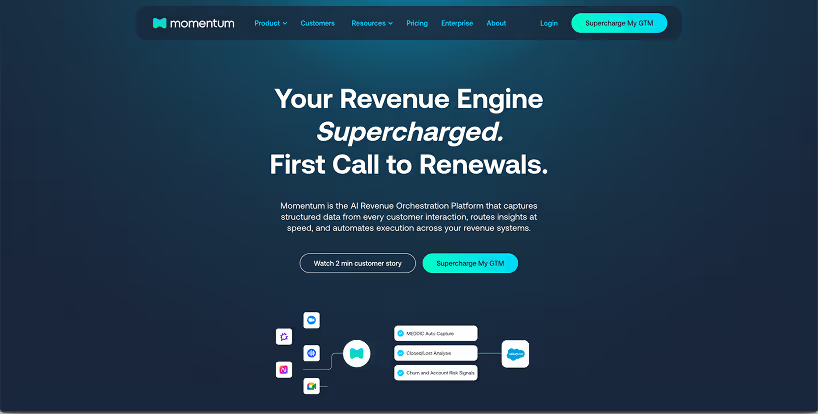
::autoboxgrid2
[LEFT]
Best for:: RevOps and GTM teams wanting AI-powered orchestration
Pricing:: Custom; rapid deployment in 1–2 weeks
Key Features:: Real-time insights from sales calls, emails, and meetings. AI-generated summaries, deal risks, and auto-logged follow-ups. Seamless integration with Slack and Salesforce. Triggers custom workflows: approvals, churn signals, renewals.
[RIGHT]
Strengths:: Eliminates manual updates and data entry. Orchestrates sales coaching, risk alerts, and follow-ups directly in Slack. Great for enforcing GTM processes and boosting rep consistency.
Considerations:: Not a “coaching tool” in isolation, it amplifies everything else. Works best as an orchestration layer across your GTM stack
::endautoboxgrid2
2. Gong
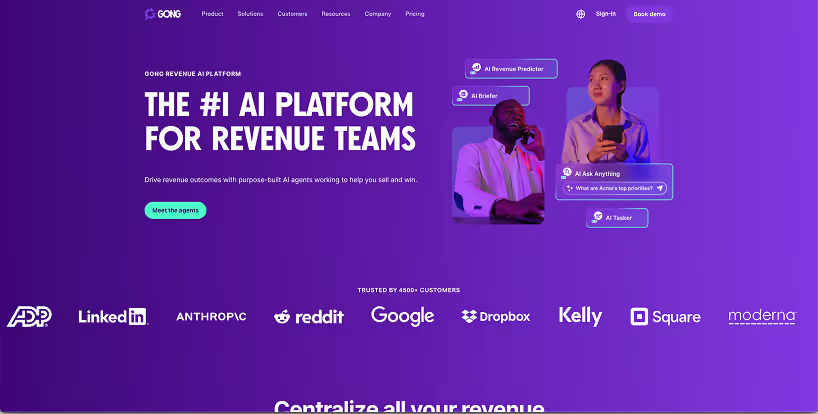
::autoboxgrid2
[LEFT]
Best for:: Deep conversation intelligence and revenue insight
Pricing:: Quote-based; typically includes a platform fee plus user licenses
Key Features:: AI-powered call recording, transcription, and real-time summaries. Sentiment analysis and deal health scoring. Role-based coaching dashboards and coaching moment extraction. GenAI for follow-up emails and real-time feedback.
[RIGHT]
Strengths:: Widely adopted by sales teams for call analysis and rep development. Strong at identifying patterns across high-performing reps. Integrates directly with CRM systems and engagement tools.
Considerations:: Heavier lift for setup and training. Some users report delays in call processing and limited dashboard customization. Requires long-term contracts.
::endautoboxgrid2
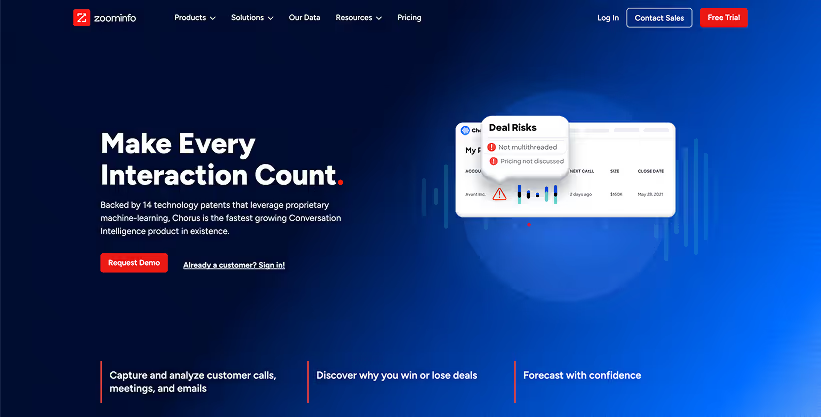
::autoboxgrid2
[LEFT]
Best for:: Mid-market and enterprise teams focused on scaling coaching
Pricing:: Quote-based, with some features bundled with ZoomInfo suite
Key Features:: Real-time transcription, topic detection, and keyword tracking. Highlights coaching moments across talk time, objections, competitor mentions. Coaching insights from top performers. Integration with major CRMs.
[RIGHT]
Strengths:: Intuitive UI for reviewing sales conversations. Useful for call follow-ups and coaching sessions. Well-integrated with Zoom and video platforms.
Considerations:: Limited customization for reports and playbooks. Pricing structure can be unclear.
::endautoboxgrid2
4. Salesloft
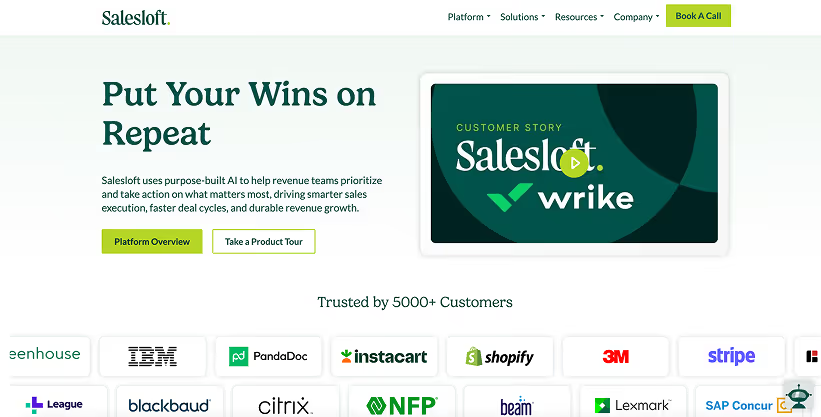
::autoboxgrid2
[LEFT]
Best for:: Coaching-focused inside sales teams with strong call cadences
Pricing:: Starts around $125/user/month with AI suite
Key Features:: AI-generated summaries, conversation tagging, and call scoring. Real-time prompts and talk-time analytics. Integrated coaching workflows and performance tracking.
[RIGHT]
Strengths:: Strong on usability and automation. Highly regarded sales coaching software for modern reps. Tight integration with Salesforce.
Considerations:: Some users cite aggressive billing tactics. Lacks full AI-powered role-playing functionality.
::endautoboxgrid2
5. Mindtickle
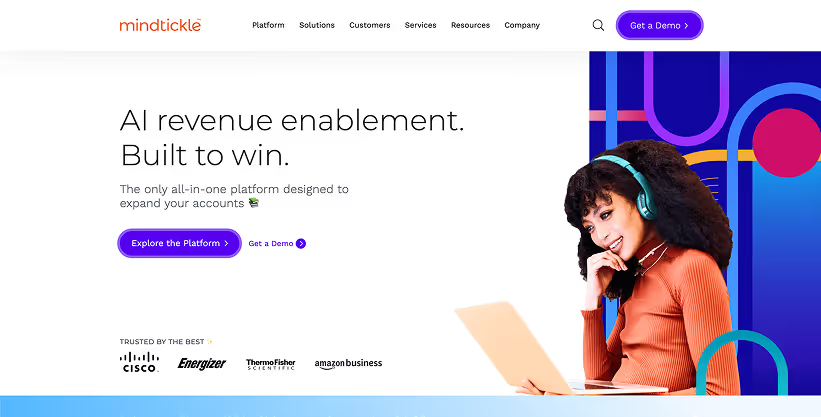
::autoboxgrid2
[LEFT]
Best for:: Structured onboarding, coaching programs, and scalable training
Pricing:: Custom enterprise pricing
Key Features:: AI-driven role-playing modules with instant feedback. Skill assessments and rep-specific coaching plans. Centralized content and coaching delivery system. Gamification, quizzes, and leaderboard mechanics.
[RIGHT]
Strengths:: Excellent for training new hires and certifying teams at scale. Real-time insights into skill development and retention. High user satisfaction with admin features and design.
Considerations:: Implementation can be complex. Steeper learning curve for enablement leaders.
::endautoboxgrid2
6. Outreach by Kaia
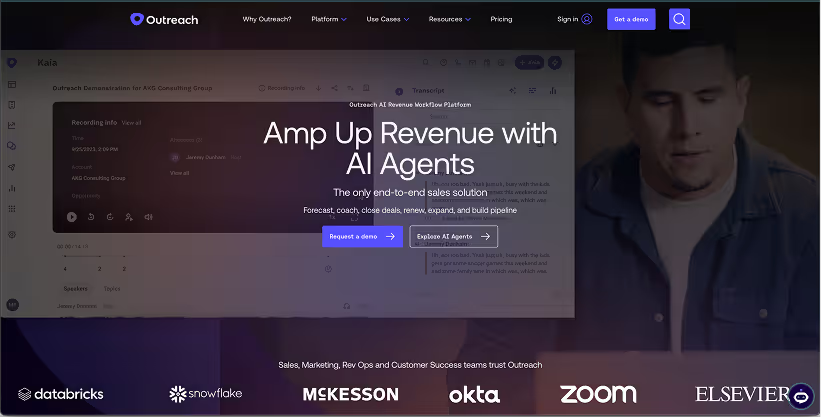
::autoboxgrid2
[LEFT]
Best for:: Sales engagement + in-call coaching and forecasting
Pricing:: Premium; AI modules are add-ons
Key Features:: Call transcription, real-time meeting insights, and automatic action items. Conversation intelligence tied to engagement sequences. AI forecasting and pipeline health analysis.
[RIGHT]
Strengths:: Great for teams running structured outreach cadences. Efficient follow-up workflows and summaries. Works well in multichannel environments.
Considerations:: Some complaints about support and billing complexity. Not a full-featured sales coaching platform.
::endautoboxgrid2
7. Enthu.AI
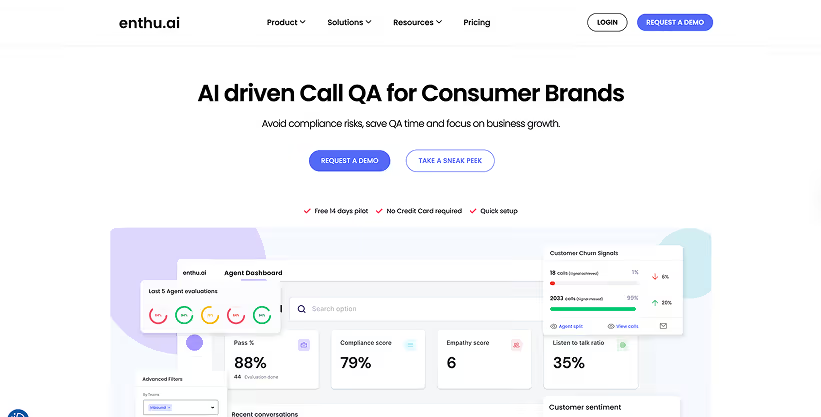
::autoboxgrid2
[LEFT]
Best for:: Cost-effective interaction analysis and QA coaching
Pricing:: Transparent pricing tiers (per-user, monthly)
Key Features:: 100% call coverage, custom call scoring, and transcription. Agent performance dashboards and feedback workflows. Call tagging and moment detection for training.
[RIGHT]
Strengths:: Top-rated on G2 for ease of use and accuracy. Ideal for smaller teams or QA-led coaching processes. Fast to implement.
Considerations:: Reporting and automation features are limited. Not deeply integrated into CRMs or sales enablement stacks.
::endautoboxgrid2
Comparison Table: Sales Coaching Platforms That Analyze Sales Interactions
::autotable
::columns=8
Platform
Best For
Real-Time Feedback
Call Transcription
AI Summaries
CRM Integration
Performance Dashboards
Pricing
Gong
Enterprise teams needing deep CI + forecasting
✅ Yes
✅ Yes
✅ Yes
✅ Yes
✅ Yes
Premium/Quote
Chorus
Sales teams scaling manager-led coaching
✅ Yes
✅ Yes
✅ Yes
✅ Yes
✅ Yes
Premium/Quote
Salesloft
Inside sales teams focused on sales calls
✅ Yes
✅ Yes
✅ Yes
✅ Yes
✅ Yes
Premium ($$)
Mindtickle
Structured onboarding & coaching programs
✅ Yes
✅ Yes
✅ Yes
✅ Yes
✅ Yes
Premium/Quote
Outreach Kaia
Engagement + meeting follow-ups
✅ Yes
✅ Yes
✅ Yes
✅ Yes
✅ Yes
Premium ($$)
Enthu.AI
Budget-conscious QA-focused coaching
✅ Yes
✅ Yes
✅ Yes
✅ Yes
✅ Yes
Transparent $$
Momentum.io
Orchestrating coaching, alerts, and automation
✅ Yes
✅ Yes
✅ Yes
✅ Yes
✅ Yes
Custom/Predictable
::endautotable
::footerrow ✅ Full Native Support ;; ⚠️ Partial or basic functionality ;; ❌ Not Supported
Momentum: An Orchestration Advantage
Most sales coaching tools focus on feedback delivery. Momentum does more: it operationalizes it. As a real-time revenue orchestration platform, Momentum turns sales interactions into structured action without the overhead.
Here’s how Momentum fits into your GTM motion:
[blue-section]
- Real-time alerts and AI-powered summaries: Instantly surface deal blockers, objection patterns, and coaching opportunities directly from sales calls and meetings.
- CRM automation for Salesforce: Auto-update notes, risks, and action items based on live conversations, zero rep input required.
- Slack-based sales workflows: Trigger next steps, flag churn risk, or launch a coaching session with a manager without leaving Slack.
- Auto-logging sales activities: From customer conversations to deal risks, everything flows into your CRM, keeping sales managers, RevOps, and sales enablement teams fully aligned.
- No rep chasing: No toggling tabs, no lost insights, no manual follow-ups, Momentum keeps salespeople selling.
[/blue-section]
Unlike standalone sales coaching software, Momentum doesn’t compete with your existing stack. It enhances it. Use it alongside Gong, Outreach, or Salesloft, and you’ll multiply the impact of your sales coaching program, uncover hidden risks faster, and streamline rep performance tracking with AI-driven precision.
Ready to Optimize Coaching, Calls, and Close Rates?
Momentum helps sales leaders, RevOps teams, and sales reps move faster with less guesswork, less manual effort, and more actionable insights. Whether you’re onboarding new hires, refining your sales coaching strategy, or scaling high-performing sales teams, Momentum gives you the edge.
[white-section]
Book a demo today to see how Momentum plugs into Salesforce, Slack, HubSpot, and more, helping you turn every sales interaction into a competitive advantage.
[/white-section]



.svg)


